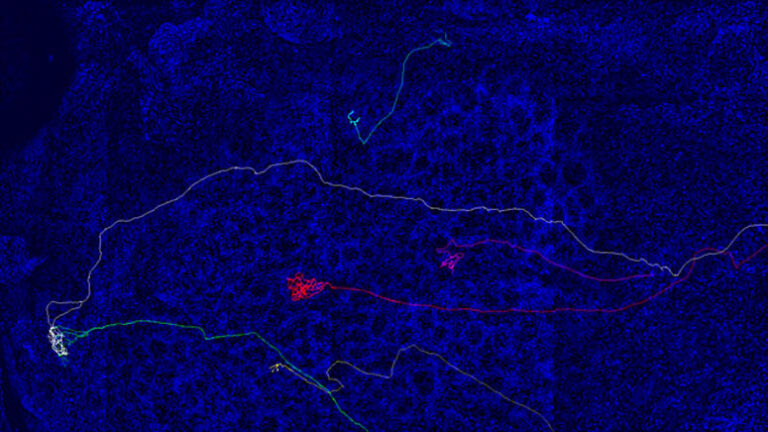Press Release

29 March 2021
Decoding the sense of smell
Neural code determines instinctual responses to attractive or aversive odors
Read Article
B.Sc., Biological Sciences and Biotechnology, Solid State Physics, Tsinghua University, Beijing, China
Ph.D., M.Ph., M.Sc., Molecular, Cellular and Biophysical Studies, Columbia University

With electrophysiology, you can really see what is happening right in front of your eyes. You expect the neurons to fire one way, and sometimes they do, and sometimes they don’t. When they don’t, you try to figure out what they’re trying to tell you.
Research Areas
Development and Regeneration, Neuroscience, Systems Biology
Courses Taught
Neuroscience; Laboratory Rotation; Thesis Laboratory
Honors
2015
Neaves Award
2010
McKnight Technology Innovation Award, Finalist
2008
Hudson Prize
Ron Yu, Ph.D., a molecular biologist and neuroscientist, joined the Stowers Institute in 2005 and currently serves as an Investigator.
Growing up in China, Yu loved looking at the stars, and considered studying astrophysics in college. But when a top-ranking university in Beijing offered him a spot in a new biological sciences program, even waiving the extensive college entrance exam, he couldn’t say no. That decision was one among many paving the way for Yu to become a leading authority on the complex neural circuitry of behavior.
Yu earned a B.S. in both biology and physics from Tsinghua University. He earned a Ph.D. in molecular, cellular, and biophysical studies from Columbia University working in the lab of Lorna Role, Ph.D., on ion channels. Yu discovered the joy of recording electrical signals from cells and built his own electrophysiology rig from scratch, mesmerized as he watched neurons respond to different stimuli.
Until beginning his postdoctoral fellowship in 1996, he hadn’t yet been exposed to genetics and molecular biology. He began work on a collaborative project with Role and Richard Axel, M.D., who had cloned the first odorant receptors, for which Axel was awarded the Nobel Prize in 2004 at Columbia University. A discussion about the “molecular shenanigans” Axel employed to remove cell types from the nervous system by deleting certain transcription factors inspired Yu to investigate the switch-like nature of transcription factors as they interact with neurons in the brain. Working at Columbia and then at the Stowers Institute, Yu has combined molecular genetics, electrophysiology, optical imaging, and studies of animal behavior to explore the biology of behavior.
Press Release

29 March 2021
Neural code determines instinctual responses to attractive or aversive odors
Read Article
News

01 July 2019
Investigator Ron Yu, PhD, has received a five-year, $2.3 million grant from the NIH’s National Institute on Deafness and Other Communicative Disorders.
Read Article
Press Release

26 October 2018
Researchers have identified "navigator" neurons that are key to setting up connections in the system responsible for the sense of smell.
Read Article
Qiu Q, Wu Y, Ma L, Xu W, Hills MJ, Ramalingam V, Yu CR. eLife. 2021;10:e60546. doi: 10.7554/eLife.60546.
Encoding innately recognized odors via a generalized population code
Qiu Q, Wu Y, Ma L, Yu CR. Curr Biol. 2021;31:1813-1825 e1814.
A Population of Navigator Neurons is Essential for Olfactory Map Formation during Critical Period
Wu Y, Ma L, Duyck K, Long C, Moran A, Scheerer H, Blanck J, Peak A, Box A, Perera A, Yu CR. Neuron. 2018;100. doi: 10.1016/j.neuron.2018.09.051.
Integrated action of pheromone signals in promoting courtship behavior in male mice.
Haga-Yamanaka S, Ma L, He J, Qiu Q, Lavis LD, Looger LL, Yu CR. Elife (Cambridge). 2014;3:e03025. doi: 10.7554/eLife.03025.
A Developmental Switch of Axon Targeting in the Continuously Regenerating Mouse Olfactory System.
Ma L, Wu Y, Qiu Q, Scheerer H, Moran A, Yu CR. Science. 2014;344:194-197.
Encoding gender and individual information in the mouse vomeronasal organ
He J, Ma L, Kim S, Nakai J, Yu CR. Science. 2008;320:535-538. Featured in: Stern P. Distinctive individual smells. Science Signaling Editor's Choice; 2008;ec155.
